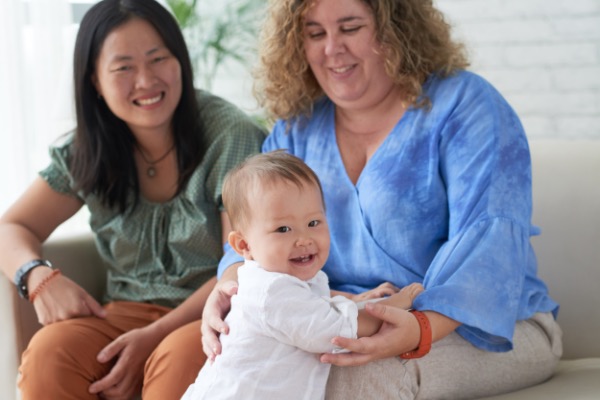At 13 months your baby is now officially a toddler, but of course they’re still your baby! As their language and cognitive skills develop rapidly, you’ll notice them become social butterflies who now notice and imitate their peers, show preferences for people and objects and even show a wider range of emotions.
Attachment and preferences
Your baby will now begin to show stronger attachment to you and their other primary caretakers, often seeking comfort and reassurance from them in new or challenging situations. You might notice your little one look up to you to get your social cue as to whether they should be happy or alarmed. With this also comes the beginning of separation anxiety. Make sure to fill their emotional cup with this sweet whole-family activity. They might cry or yell when separated from you or the other parent. Just as they begin to show preference for their primary caregivers, they’ll show preference for certain objects, people or even places! You may notice your child cries when they’re indoors and happy when outdoors, irritated when a friendly stranger approaches, or happy and calm when they have a security toy or object in their hand (as opposed to when they didn’t). You can expect your toddler to show love and affection with tiny hugs and kisses to you and other family members.
Parallel Play
While they may not engage in cooperative play yet, toddlers often participate in parallel play, where they play alongside other children while remaining focused on their own activities, sometimes even noticing what their peers do to imitate their actions. This marks the beginning of social interaction and sharing space with peers.
They will also imitate the actions and behaviors of adults and older children, including social interactions. For example, they might pretend to carry a doll. They will even begin to learn about feelings and emotions through role-models, beginning to show the first signs of empathy. You might notice your baby showing a frown while they observe another child crying or having a tantrum. As mentioned previously, your little one might look up to you in a new situation to get your feedback about how “we feel about this situation”. Is it fun? Is it safe? Are we angry? So make sure to model a whole range of emotions and watch out for your own reactions if you don’t want them to scold the dog all the time or complain! A positive attitude from a baby’s role models will help them have a more positive state of mind. Get a happy start to your day singing this song together every morning.
Developing Independence
Your little one is starting to define themselves apart from you. They are showing more and more signs of independence through the correct use of everyday items, feeding independently and using personal care tools like a hairbrush and toothbrush. This video will give you some great tips!
Along with that, comes some defiance. As they seek more independence, your little one might begin to display defiant behavior such as saying “no” to everything or beginning to resist certain requests. In fact, one of their first words will likely be “no”, and they might even use it when they mean to say “yes” too (haha!). With this behavior they are asserting their autonomy, a crucial part of their development which helps them explore boundaries.
List of milestones for 13-15 months
- Expresses love to those familiar, like hugging them.
- Changes their play to imitate friends (starts making block towers when peers do so).
- Engage in parallel play.
- Looks sad or upset when they see another person or child crying.
- Can correctly use some everyday items (like sipping from a cup or dialing a phone).
- Can feed independently, with or without utensils.
- Uses personal care tools like a hairbrush and toothbrush correctly.








